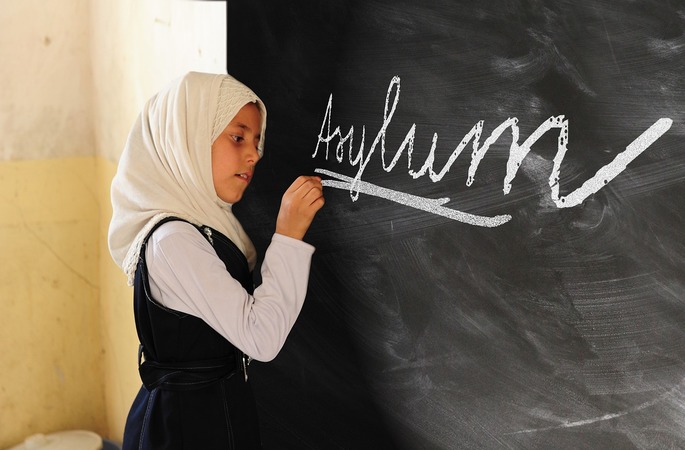Why I am an activist for the refugees:
Something shifted inexorably for me when Reza Barati was murdered, on 17 February 2014.
My life changed, and it has remained altered. Before that date, I was someone who disapproved and despaired of the noxious domestic politics in Australia that led to the leaders of both major political parties saying that no one who came by boat to seek asylum in our country would ever be resettled there.
My resistance to this was to change my vote, to the Australian Greens ahead of every other party, in the 2001 election and every election since, and to write to politicians, imploring them to change policy.
I wrote letters to the press, talked to my friends and family, rang talkback radio shows, talked in supermarket queues and to anyone who would listen, whether willingly or not, about the evil of indefinite detention.
But Reza’s death changed me, and I believe many others. We are different people now. We knew him only in death, and yet his face is as familiar to us now as that of any politician. We remember that date, the terrible night he died, though we have forgotten many others.
Reza was 23, an Iranian Kurd. He was physically imposing, temperamentally sweet and gentle. ‘A gentle giant’ is how other refugee men on Manus Island describe him: someone, who was always willing to help others.
He was dragged from his room, where he was hiding, by locals who had invaded the camp, and was attacked by them and at least two Australians, security guards who were known to be racist and to use humiliating insults about and to refugees.
He was beaten over the head with a large, heavy piece of timber, which had nails protruding from it.
Finally, as he lay immobile on the floor, his skull was crushed by a large rock, dropped from above. His roommate, fellow Kurd Behnam Satah, saw it all.
From the beginning, the Australian government’s response was to blame the victim. Reza Barati, Immigration Minister Scott Morrison claimed, was killed while leading a riot.
The lie struck a chord with the percentage of the population (I usually put it at 30 – 35%) who want to think the worst of asylum seekers because that would justify their hostility towards them. It stuck.
The Australians who were seen and identified as involved in the fatal attack were spirited off Manus and flown out of PNG the next day, back to Australia. They have never been charged.
After Reza’s death, I sought out other people who shared my horror at what Australia was doing to asylum seekers, and I also looked again at the friend requests I had begun to receive from Manus Island and Nauru, from asylum seekers, men and women, who saw my posts on Facebook, expressing shame at the so-called ‘Pacific solution’.
I accepted some of those requests, and began talking to refugees.
As trust builds between human beings, we tell each other more. I began talking every day with Iraqi, Iranian, Tamil, Hazara and Rohingya refugees, and soon they were as much a part of my life as anyone I knew in my community in Perth, Western Australia.
Seventy-seven other asylum seekers were seriously injured on the night Reza Barati was murdered, and I have never forgotten the impression made on me by the first-hand accounts of some of those other victims of a horrific attack on unarmed and peaceful refugees.
Many of the guards who should have been at Manus OPC that night had left, suggesting they knew what was going to happen. At least four hours before the attack on Reza, in the late afternoon of 17 February, a Rohingya man who became a close friend of mine, and the first person on Manus to whom I offered a home when he got to Australia, was assaulted by an Australian guard.
“I was standing outside my sleeping quarters’’, he said, “And a G4S security guy walked towards me, then leapt into the air and kicked me in the face. He knocked three of my teeth out.’’
I asked if he could identify the man. “Not now”, he said.
“I was on the ground, and I covered my eyes with my arms because I feared he would blind me.’’
‘’But you’re certain he was Australian?’’
“Certain. He was – you know – big.”
The Rohingya man is 165 cm tall and weighs 60 kilograms.
A gentle Pakistani refugee, a man with a Masters in Business Administration, who speaks three languages, tells me that he had come to hate the Australian guards who were racist, and called Muslims ‘terrorists’ and ‘goat-fuckers’, and claimed the Prophet was a paedophile; but he had loved his Australian case manager, who, when she saw him after his head was dashed with a rock, wept.
“I was covered in blood”, he said. I had a head wound, and my head, face and shirt were awash with blood. When she saw me, she washed my face so gently, washed and patted the wound on the back of my head.
She was crying, and she kept saying, “What have they done to you?”
From such intimacies, my friendships with the men on Manus, and women and men on Nauru began.
I cannot, now, imagine my life without these courageous human beings. I have edited their poetry, shared their stories, cried with them as nine more young, strong, spirited men have died – an equal number of dead on Manus and Nauru.
They have died from medical neglect, the repeated overriding of doctors’ instructions by Canberra bureaucrats with no medical qualifications, and from suicide, and possibly another murder – that of Iranian Hamed Shamshiripour – on Manus.
The journey continues.



